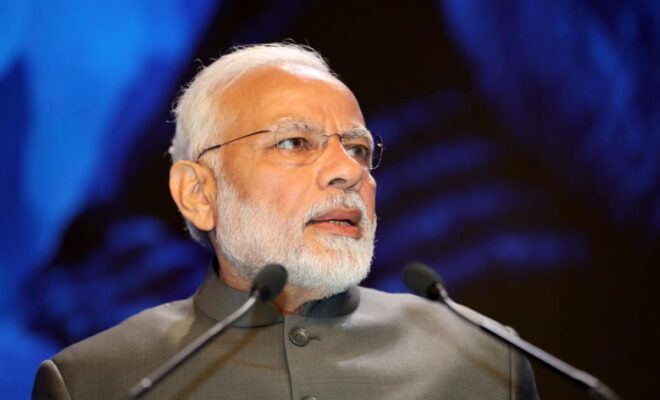Politics
Indian Voters Sour On Modi’s Party In State Polls

The results are likely to boost the fortunes of the Congress party, which has sought to present itself as a credible rival to the BJP and a potential leader of a broad anti-Modi alliance.
Voters in India delivered stinging defeats to Prime Minister Narendra Modi’s party in state elections on Tuesday, a sign of growing dissatisfaction with his government as it looks ahead to national elections next year.
Just months remain before the world’s largest democracy holds its general election, a once-in-five-year effort to seat a new parliament. Modi led his Bharatiya Janata Party (BJP) to a decisive victory in 2014, but Tuesday’s state election results indicate that he could face a fight to retain power in 2019.
Modi remains popular, but after four years in office, discontent with his tenure has increased. Farmers say they are being squeezed by rising costs and growing debts. Job creation is lackluster. Meanwhile, the BJP’s embrace of a muscular brand of Hindu nationalism has emboldened extremists, who have sometimes engaged in violence against Muslims.
Voters in two major states – Rajasthan and Chhattisgarh – were poised to eject the BJP from the leadership of the state governments, according to running vote counts by the Election Commission of India. The Congress party, India’s main opposition, appeared set to take power in both states. It also held a smaller lead in a third state, Madhya Pradesh, with counting still underway.
The setbacks for the BJP came in Hindi-speaking states in north India, the region that has formed the bedrock of the party’s political success. Recent history indicates that state elections are an accurate bellwether for voting trends in national polls, according to an analysis by the Carnegie Endowment for International Peace.
Tuesday’s results are a “major embarrassment for the government,” said Satish Misra, a senior fellow at the Observer Research Foundation in New Delhi who has written extensively about Indian domestic politics. It sends “a dangerous signal” to the BJP that it is losing its grip on states that were crucial to its victory in 2014.
The results are likely to boost the fortunes of the Congress party, which has sought to present itself as a credible rival to the BJP and a potential leader of a broad anti-Modi alliance. The Congress is led by Rahul Gandhi, whose father, grandmother and great-grandfather all served as prime minister of India.
During the state election campaign, Modi and other members of the BJP ridiculed Gandhi, 48, as the callow scion of a political dynasty. But the Congress leader can take credit for engineering what appears to be the most significant defeat for Modi since he came to power in 2014. Gandhi “may not be a match for Modi yet, but there’s certainly more acceptance of him,” said Neerja Chowdhury, a political analyst in Delhi.
Television networks showed Congress party workers exulting at the results, dancing and setting off firecrackers. “All those people who were confident of a clear victory for Narendra Modi [in 2019] should now reconsider their positions,” said party spokesman Pawan Khera. In the state polls, the Congress party fought “against the divisive campaign of the BJP and stayed focused on the relevant issues,” such as distress among farmers and unemployment, Khera said.
In the run-up to the polls, the BJP deployed one of its most controversial leaders, Yogi Adityanath, a radical Hindu monk who serves as the chief minister of Uttar Pradesh, India’s largest state. Adityanath addressed dozens of rallies – far more than Modi – where he attacked the Congress party as soft on terrorism and too attentive to Muslim voters.
In Rajasthan, farmers and members of one of the state’s dominant castes were displeased with the government, generating a strong anti-incumbency sentiment that pushed the BJP out of power. But the party’s defeats in Chhattisgarh and, apparently, in Madhya Pradesh were more surprising. The BJP has governed Madhya Pradesh, a large agrarian state in central India, for 15 years.
The BJP sought to play down the significance of the results, arguing that the party performed well given the tendency of Indian voters to punish incumbents. Sambit Patra, a party spokesman, rejected the idea that the polls were a harbinger of things to come. “To say that this is going to affect the national scenario is absolutely bunkum,” he said in a television interview.
Because Indian elections are such massive logistical undertakings, they often unfold in stages, and results may not be counted immediately. Madhya Pradesh and Chhattisgarh voted in November, while Rajasthan held its election last week.
Two other states also voted in the most recent round of elections. In Telangana – India’s youngest state, carved out of the larger Andhra Pradesh four years ago – the regional party that led the push for statehood notched a convincing victory. And in the tiny northeastern state of Mizoram, a regional party allied with the BJP won the election.
(c) 2018, The Washington Post

You must be logged in to post a comment Login